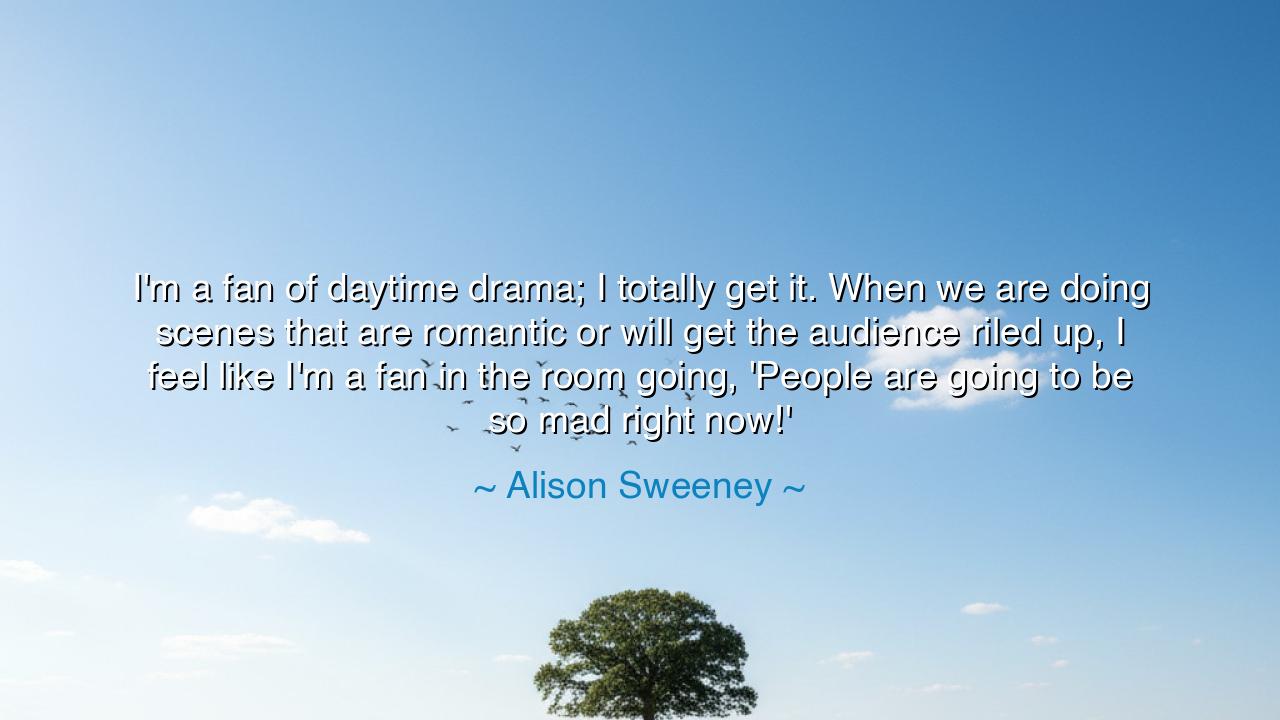
I'm a fan of daytime drama; I totally get it. When we are doing
I'm a fan of daytime drama; I totally get it. When we are doing scenes that are romantic or will get the audience riled up, I feel like I'm a fan in the room going, 'People are going to be so mad right now!'






“I’m a fan of daytime drama; I totally get it. When we are doing scenes that are romantic or will get the audience riled up, I feel like I’m a fan in the room going, ‘People are going to be so mad right now!’” Thus spoke Alison Sweeney, and her words uncover the sacred bond between storyteller and listener, between actor and watcher. She reveals that the artist is not only a performer set apart, but also a participant in the very joy, outrage, and passion of the people who behold the tale. She is both creator and fan, both giver and receiver of the drama’s power.
The world of daytime drama—soap operas, serialized tales—has always thrived upon the heightened pulse of human emotion. Betrayals, reunions, confessions, and kisses fill the screen, not because they are always realistic, but because they capture the core of human longing and fear. To call herself a “fan” is to acknowledge that she, too, is swept into the storm, that the romantic spark and the shocking twist still carry power even for the one who helps create them. In this lies a beautiful humility: the artist does not stand above the audience but sits among them, laughing, gasping, crying in spirit.
The ancients also understood this. In the amphitheaters of Greece, the playwrights knew that their tragedies and comedies would ignite collective emotion. When Sophocles revealed the terrible truth of Oedipus’s fate, or when Aristophanes unleashed a moment of bawdy humor, the audience cried or roared together as one. The actors themselves felt the contagion of that passion. They were not merely delivering lines; they were conduits for emotions that swept through the crowd like fire. Sweeney’s words echo this same truth: the artist is not immune to the drama, but carried along with it.
Consider also the tale of Charles Dickens, who read his novels aloud to vast gatherings. He wept at the sorrow of his own characters, and laughed at their triumphs, just as his audience did. When he read the death of Little Nell, both reader and listeners sobbed together, as though they all lived within the same story. This is what Sweeney means when she says she feels “like a fan in the room”—she, too, marvels at the power of story, even as she helps weave it.
Her mention of romantic scenes is particularly powerful. For love, when displayed in story, is never neutral; it stirs longing, jealousy, admiration, or indignation. To watch two characters embrace is to be reminded of one’s own desires, wounds, or memories. That is why she exclaims with delight, “People are going to be so mad right now!”—for she knows that the drama is not inert, but alive, sparking fires in the hearts of all who witness it. This is the alchemy of storytelling: turning words and gestures into emotions that ripple outward into countless lives.
The lesson, then, is profound: the power of story lies not in perfection or logic, but in its ability to move the heart. To be a “fan” of the very thing you create is not weakness; it is authenticity. It means you have not grown numb to wonder. The greatest artists are those who feel alongside their audience, who are thrilled by the same turns, wounded by the same sorrows, lifted by the same joys. In such unity, art fulfills its ancient purpose: binding the hearts of many into one shared rhythm.
Practical action flows from this wisdom: when you tell stories—whether on stage, on screen, in books, or in the daily dramas of your own life—do not be detached. Let yourself feel the passion you stir. Enter the moment as both creator and participant. Rejoice with your listeners, grieve with them, laugh with them. In this way, your words and actions will be true, and your impact lasting.
So, children of tomorrow, remember Alison Sweeney’s teaching. To be both storyteller and fan is the highest calling of art. For when you live within the very drama you create, you remind the world that we are not watchers only, but participants in life’s great unfolding play. And in this shared drama—be it tenderly romantic, fiercely tragic, or joyously comic—we discover not only entertainment, but the essence of being human.






AAdministratorAdministrator
Welcome, honored guests. Please leave a comment, we will respond soon